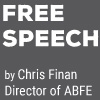- Categories:
A New Frontier in the Fight for Reader Privacy [5]
“Free Speech” is a monthly column by Chris Finan, director of the American Booksellers for Free Expression (ABFE), that shares his personal thoughts and opinions on a broad range of free expression issues; the views expressed do not necessarily reflect those of the American Booksellers Association. Finan welcomes comments and suggestions at [email protected] [6].
Mark Klein, a senior technician for AT&T, noticed something unusual as he toured a company facility in San Francisco in 2003.
Workmen were building a new room next to one containing a switch that sends long distance telephone calls through the AT&T network. When Room 641A was finished, it was sealed by two locks. Only one supervisor could open the door.

Klein knew that the National Security Agency (NSA) had something to do with the secret room. He later testified that he was able to determine from a list of equipment in 641A that the NSA was probably tapping into the switch next door. Later, 641A was also connected to AT&T’s fiber optic network, giving the NSA access to the e-mails of AT&T customers as well as users of the telecommunications companies to which AT&T was linked.
Klein was told by another AT&T technician that similar rooms were being built at AT&T facilities in Seattle, San Jose, Los Angeles, and San Diego.
It took another decade for the world to realize the full implications of Klein’s discovery. In 2013, the revelations of whistleblower Edward J. Snowden, the former NSA contractor, confirmed a frightening truth:
The United States government is collecting all digital communications between everyone in the U.S. (citizens and residents) and people in foreign countries, and these communications include e-mails, instant messages, web pages, voice calls, and video chats. In the absence of search warrants, the NSA copies and combs through vast amounts of Internet traffic, searching for communications that contain certain types of data associated with the people it is investigating, including e-mail addresses and telephone numbers. It is searching not only messages to and from suspected terrorists but also any communications about them.
Why is this frightening?
The NSA is conducting this surveillance without establishing that there is any evidence to believe that the people who send and receive these messages are guilty of any wrongdoing. Normally in criminal investigations law enforcement officers must establish that there is “probable cause” for believing that a person is contemplating a crime before obtaining a warrant to conduct a search. (The USA Patriot Act relaxed this requirement. However, the only precedent for the dragnet approach the NSA is using for international communications is the mass collection of the telephone records of Americans, a practice that Congress recently prohibited.)
Being able to conduct searches without probable cause gives the FBI and other law enforcement agencies enormous power. Historically, that has led to terrible abuse. During the Cold War, the civil rights movement, and the war in Vietnam, the government conducted secret surveillance of dissident groups that were engaging in legal, constitutionally protected protests against government policies. On many occasions, the government used that information in attempts to punish protesters and destroy their organizations.
When these abuses came to light in the 1970s, Congress passed a number of reforms, including the Foreign Intelligence Surveillance Act (FISA), which requires the government to obtain warrants from a special court before conducting surveillance.
After the 9/11 attacks, the Bush administration secretly gave the NSA permission to ignore FISA and authorized it to conduct surveillance in a terrorism investigation without a warrant as long as one of the two parties in any communication resided in a foreign country. When journalists exposed this illegal spying, Congress rode to the administration’s rescue, amending FISA to authorize such surveillance.
But it is up to the courts, not Congress, to determine whether NSA surveillance programs are constitutional.
The American Civil Liberties Union has filed three lawsuits since 2006 challenging warrantless wiretapping as a violation of the First Amendment’s protection of free speech and the Fourth Amendment guarantee of privacy. The plaintiffs in these cases have been human rights groups, labor activists, defense attorneys, and media organizations that argue that NSA spying threatens their ability to work confidentially with clients and news sources.
In the latest case, Wikimedia v. NSA, booksellers and librarians have filed an amicus brief [7] expressing concern that NSA surveillance is a threat to reader privacy. Snowden’s leak of government documents about NSA surveillance programs has confirmed that the NSA is collecting all digital records, including those relating to the distribution of books.
The amicus brief filed on September 3 by the American Booksellers Association, the American Library Association, and other library groups emphasizes the extent to which the purchase and use of books is now conducted online. “A patron’s search of a library or bookseller’s online collection; the purchase or reserve of physical books; the download of e-books; and the use of online reference tools — the privacy of all these interactions, and others, are invaded by government surveillance conducted on the Internet’s backbone,” the brief says.
The first two ACLU cases were not successful. In the first, a district court judge declared the NSA surveillance unconstitutional, but she was overruled by an appeals court on the grounds that the plaintiffs could not prove that the NSA spied on them. As a result, they lacked “standing” to challenge the law. In the second case, a different appeals court ruled in favor of the plaintiffs on standing but was overruled by the Supreme Court in a 5-4 decision.
There is reason to hope that the third case, which was filed in March, will reach the Supreme Court and that this time it will allow ACLU to make the free speech and privacy arguments against warrantless wiretapping. We know now that the international communications of all Americans are being searched. So it should be much easier for the plaintiffs to establish standing.
The main purpose of the bookseller and librarian amicus is to strengthen the plaintiffs’ assertion that they have standing. The courts have repeatedly accepted the right of booksellers and librarians to go to court to defend the free speech and privacy rights of their customers and patrons.
The district court has not decided whether to accept our brief. It is unusual to file an amicus at that level. But if the brief is rejected, we will submit it again in the circuit court and the Supreme Court.
One way or another, we will have our say in a case that will critically affect the future of free speech.
